
An arboretum in a general sense is a botanical collection composed exclusively of trees of a variety of species. Originally mostly created as a section in a larger garden or park for specimens of mostly non-local species, many modern arboreta are in botanical gardens as living collections of woody plants and is intended at least in part for scientific study.
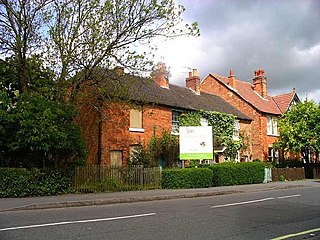
Mickleover is a large suburban village of Derby, in Derbyshire, England. It is 2 miles (3.2 km) west of Derby city centre, 10 miles (16 km) northeast of Burton-upon-Trent, 19 miles (31 km) west of Nottingham city centre, 13 miles (21 km) southeast of Ashbourne and 12 miles (19 km) northeast of Uttoxeter.

John Claudius Loudon was a Scottish botanist, garden designer and author. He was the first to use the term arboretum in writing to refer to a garden of plants, especially trees, collected for the purpose of scientific study. He was married to Jane, née Webb, a fellow horticulturalist, and author of science-fiction, fantasy, horror, and gothic stories.

Derby South is a constituency formed of part of the city of Derby represented in the House of Commons of the UK Parliament since 1983 by veteran MP Margaret Beckett of the Labour Party. She has served under the Labour governments of Harold Wilson, James Callaghan, Tony Blair and Gordon Brown. She became interim Leader of the Labour Party in 1994 when John Smith suddenly died. She has also served under Neil Kinnock and Smith himself.

The Royal Crown Derby Porcelain Company is the oldest or second oldest remaining English porcelain manufacturer, based in Derby, England. The company, particularly known for its high-quality bone china, having produced tableware and ornamental items since approximately 1750. It was known as 'Derby Porcelain' until 1773, when it became 'Crown Derby', the 'Royal' being added in 1890. The factory closed down in the past under Royal Doulton ownership, but production was revived under the renewed ownership of Hugh Gibson and Pearson family.

Arboretum is a residential area of the City of Nottingham in the county of Nottinghamshire, England. The arboretum from which the neighbourhood takes its name was the first designated public park in Nottingham selected under the authority of the Inclosure Act 1845. The botanist and horticultural publisher, Samuel Curtis (1779–1860), oversaw the design of the park, on 11 May 1852, the park was officially opened. The park was opened by the Mayor of Nottingham, the lace manufacturer Mr W Felkin, and the Sheriff of the Borough of Nottingham, a Mr Ball, in front of a crowd of 30,000 people. It is Grade II* listed.

Derby Arboretum is a public park and arboretum in the city of Derby, England, located about 1 mile (1.6 km) south of the city centre in the Rose Hill area. It was opened in 1840, following the donation of the land by local philanthropist Joseph Strutt, and to designs by John Claudius Loudon. It was the first publicly owned, landscaped, urban, recreational park in England. After many years of neglect, the Arboretum was extensively refurbished in the early 21st century with the aid of a Heritage Lottery Fund grant of almost £5 million. It is listed as Grade II* on the English Heritage Register of Parks and Gardens of Special Historic Interest in England.
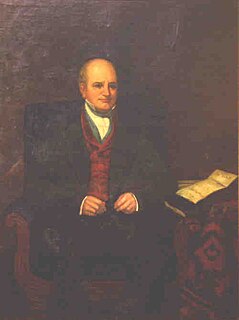
Joseph Strutt (1765–1844) was an English businessman and philanthropist, whose wealth came from the family textile business. A native of Derby, Strutt was a radical social reformer who made significant donations and founded several important institutions in the town, including donating the land for the creation of Derby Arboretum, England's first urban public park. He twice served as Mayor of Derby.

William John Coffee (1774–1846) was an internationally renowned English artist and sculptor who worked in porcelain, plaster, and terra cotta. He also worked in oil paint, although this was not the medium for which he became famous. His early career was as a modeller for Duesbury at the china factory on Nottingham Road in Derby, England. The latter part of his life was spent in America.

William Duesbury (1725–1786) was an English enameller, in the sense of a painter of porcelain, who became an important porcelain entrepreneur, founder of the Royal Crown Derby and owner of porcelain factories at Bow, Chelsea, Derby and Longton Hall.

The Derby Philosophical Society was a club for gentlemen in Derby founded in 1783 by Erasmus Darwin. The club had many notable members and also offered the first institutional library in Derby that was available to some section of the public.

The production of Derby porcelain dates from the second half of the 18th century, although the authorship and the exact start of the production remains today as a matter of conjecture. The oldest remaining pieces in the late 19th century bore only the words "Darby" and "Darbishire" and the years 1751-2-3 as proof of place and year of manufacture. More important is the fact that the production of porcelain in Derby predates the commencement of the works of William Duesbury, started in 1756 when he joined Andrew Planche and John Heath to create the Nottingham Road factory, which later became the Royal Crown Derby.。

André or Andrew Planché, or Planchè, was a jeweller, potter and theatre person, son of French Huguenot refugees. He lived in Derby, where he had at least four children.
William Duesbury (1763–1796), was the owner of Royal Crown Derby pottery works.
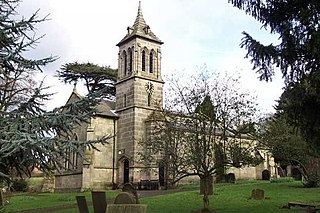
St John the Baptist's Church, Boylestone is a Grade II* listed parish church in the Church of England in Boylestone, Derbyshire.

Derby Racecourse is a former horse racing venue in Derby, England, from 1848 to 1939. It was preceded by two earlier courses, at different locations.
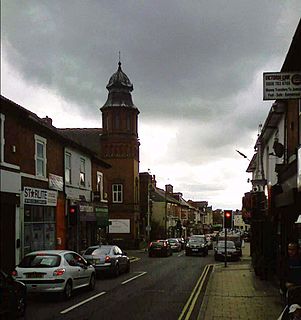
Arboretum is an electoral ward in the city of Derby, England. It includes Derby city centre and the inner city suburbs of Pear Tree and Rose Hill, as well as part of Normanton. It covers much of the area of the historic township of Litchurch. The ward, which takes its name from Derby Arboretum in Rose Hill, had a population of 18,590 in 2011.
Michael Kean was an Irish artist. He was a miniature painter, and for a period was owner of the porcelain factory in Derby later known as Royal Crown Derby.

The 2019 Derby City Council election took place on 2 May 2019 to elect members of Derby City Council in England. This was on the same day as other local elections. The council remained under no overall control, with the Conservative Party overtaking the Labour Party as the largest party after gains in Chaddesden and Derwent. The Labour Party lost many of its leading councillors, including deputy leader Martin Rawson, former cabinet member Asaf Afzal and former Group and Council leader Paul Bayliss.
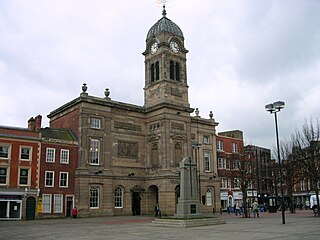
Derby Guildhall is a municipal building in the Market Place, Derby, England. It is a Grade II listed building.


















